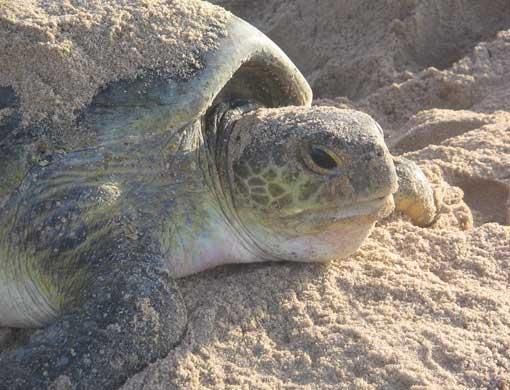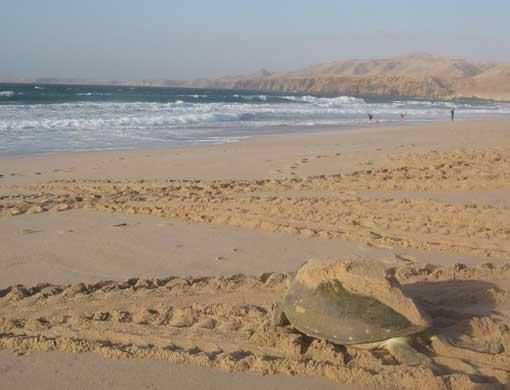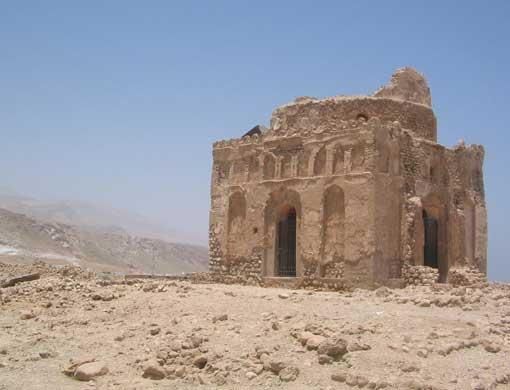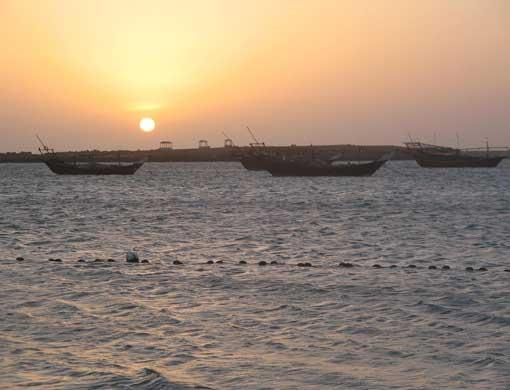It was a windy night, but there was still quite a crowd gathered on the beach.
For thousands of years, turtles have come to this beach in Oman to lay eggs — and there were a few of them that evening, too.
The turtle beach, which is about a seven-hour drive up the coast from Muscat, draws several tourists every evening — and around 20 people were standing in the darkness when I reached.
The guide, an Omani dressed in his national clothes, told us about the history of green turtles before leading the way to the beach. The group followed in a single file, trying to make out the way in the darkness.
A real wild time
We walked to the far side of the beach — the wind continuing to howl — and came upon a turtle.
It was sitting in a depression in the sand it had created with its flippers. When we pointed the flashlight at it, we saw it flick the sand behind, deepening the hole.
The guide wandered off and, a few moments later, made another discovery. This time the turtle was not merely digging a hole, it was laying eggs.
The guide shone his torch on the turtle and called people from the group to come and take a look.
As its flippers moved the sand aside, more gently this time, the turtle laid large, shiny white eggs on the ground beneath her.
The experience was like watching a wildlife documentary — except that it was taking place right in front of our eyes.
In time, the eggs hatch and baby turtles climb out of the sand and using their flippers, make their way awkwardly across to the sea. The guide picked a young turtle that he said he found nearby.
The tiny creature, with a body smaller than the palm of an adult's hand, was photographed and picked up by several members of the group.
The magic of life
Afterwards, the guide put the bewildered little creature back on the sand near the sea. The tiny thing just moved in circles, one of its limbs clearly damaged. The guide suggested that a fox must have had a go at the poor creature, but that seemed improbable.
More likely, it must have been manhandled by someone and now its life was almost certainly over even before it had begun.
The group left slightly later, but early next morning I and a few others returned to the beach.
Here we found another adult turtle sitting in a large hole, which, after a few minutes, began the long trip back to the sea. It was a painfully slow process.
The awkwardness of these animals on land contrasts with the speed and elegance with which they move through water.
A little later on, another started its journey back to the ocean.
It was not just adults that were going to the sea that morning. In a few of the depressions, under which the eggs had been laid, baby turtles were emerging from the sand as if by
magic.
And what a struggle they were up against. From the beach to the sea was an awful long way and the odds seemed stacked against the tiny animals.
However, a few did make it. Covered in sand, they were washed clean when the waves rolled over them, although as often as not, the water just pushed them a few metres back further and they had to start walking all over again. Finally, they managed to start swimming and enjoying life in their true habitat — the ocean.
Unwelcome guests
The area around turtle beach, which lies beyond Sur beside the Arabian sea, is also worth exploring.
The after effects of the recent cyclone Gonu are still visible, as many of the roads are badly damaged. One stretch on the way simply ended at a huge cliff where the highway had completely collapsed.
Later, our group hired a small boat and the owner took us out to the sea so we could go swimming with the adult turtles in the bay.
The turtles were not keen on human company and swam away at an incredible speed whenever anyone came near them.
It was a reminder that, fascinating though these creatures are, they are wild animals which do not welcome contact with humans. The last thing that should happen is for their lives to be disrupted and survival in the area threatened by a burgeoning tourism industry.
Go there ...Turtle beach
The closest airport to the turtle beach is Muscat.
From Dubai: Emirates flies daily. Fare: Dh1,200
Oman Air flies daily. Fare: Dh620
Qatar Airways flies daily via Doha. Fare: Dh530
From Abu Dhabi: Etihad Airways flies daily. Fare: Dh660
Oman Air flies daily. Fare: Dh660
British Airways flies daily. Fare: Dh300
(All fares exclusive of taxes)
— Information courtesy: MMI Travel
Where to stay
There are a few places to stay in the area, among them is the Turtle Beach Resorts which consists of a few dozen basic huts.
The accommodation is nothing fancy but the setting beside a bay, dotted with traditional wooden dhows, is beautiful.















